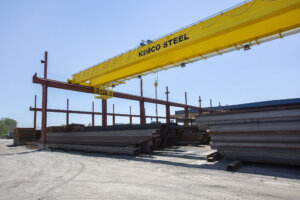Capital Coated Steel maximise their iMetal data with Phocas
When Simon Nurse Head of Works at Capital Coated Steel was invited by Metalogic to a demonstration by Phocas Software this self-proclaimed data enthusiast had no idea he would find what he didn’t know he was looking for!
The software recommendation came at a crucial time for Capital CS as the pandemic required the business to rethink and reshape their operations to maintain the high level of customer service, they pride themselves on. Critical insights were essential if this distributor was to remain agile amidst an increasingly turbulent global market.
Read more on this blog from Phocas how real time data enabled CCS to react faster to a changing situation.
If you would like to unlock the power of data in your iMetal ERP click the link below to learn more and view the Phocas + Metalogic Webinar.
‘Top 5 sales KPI’s for the metal industry’

Image courtesy of Malte Helmhold
Metalogic + Phocas Top 5 Sales KPIs for the Metal Industry
Unlock the power of data in your iMetal ERP to operate with confidence.
Sales teams working in the metal industry are feeling the pressure of working in a volatile market and supply chain challenges. These issues are amplified by high transportation costs, delivery delays, and changes in demand. This is why KPIs are so important to the modern metal business.
What you measure depends on what business goals you have set. In this webinar, you will learn about several sales KPIs that are useful to keep a team on track, including:
- Trend analysis: more insight into overall business performance over time.
- Sales performance by person: determine the average deal size and revenue per sales rep
- Sales performance by location: track performance to determine what branch, region, or territory is receiving the biggest demand
- Product-level profitability: identity what products are contributing the most to your bottom line
- Customer-level profitability: critical KPI to improve customer engagement.
Like to learn more?
Click the link to watch the Phocas + Metalogic webinar:
‘Top 5 sales KPI’s for the metal industry’
Meet the speakers
 Jason Bradshaw Data Analytics Consultant |
 Pete Bushell Solutions Consultant |
Featured Image courtesy of The Average Tech Guy
Trade Credit: Sector Update – Metals
Trade Credit: Sector Update – Metals
Supply and demand have always been the most important factors in any commodity price movement, and that remains the case with metals.
In 2020, as Aerospace, Automotive and Construction demand was heavily impacted by lockdowns in the UK and Europe, steel mills moved to shore up cash and stem losses by taking capacity out of the market through the idling and closing of a number of furnaces and facilities.
The ability of the construction and manufacturing sectors to adapt to new working practices to combat Covid has meant demand has returned relatively quickly. But bringing back steel production is a slower process—you can’t just turn the steel production taps on again overnight.
As a consequence, with caution on future demand weighing on steel producers’ plans and a number of problems associated with various blast furnace restarts, the availability of steel has failed to keep up with the returning demand.
In addition, China (which is, by far, the largest steel producer globally) has had a strong rebound from the initial Covid shutdowns and whilst still producing a record amount of tonnage, the level of demand from domestic manufacturers has also increased. So much so, in fact, that China was, for a period, a net importer of steel in stark contrast to recent pre-Covid times.
The decrease of exports and the continuation of EU safeguards and quotas mirrored by the UK in response to Brexit has resulted in the tightening of steel supply, with lead times from Europe and UK producers increasing and steel availability generally being restricted.
With the lack of availability and such long lead times, we have seen a near doubling in steel prices (more for some products) as service centres and end-users struggle to secure products to maintain sales and forward orders.
This has been a once-in-a-generation period of stock profits for the service centres, which has allowed unprecedented margins to be made as input prices lagged behind sale prices, especially in the spot market. With such a scarcity of products such as cold-rolled coil, the onus has been on securing supply rather than price, allowing higher and higher margins to be agreed upon for those with metal in stock or on the water. This period of high margins has helped to boost businesses’ finances and allowed for a welcomed rebuilding of balance sheet strength and liquidity.
As we move into the second half of 2021, other factors initially caused by Covid lockdowns are impacting the supply chain. As buyer purchasing trends changed, microchip and semiconductor availability are now holding up automotive sectors and production lines as consumer electronics production increases resulting in a slowing of supply to car manufacturers. The SMMT report in May 2021 shows car sales were 22.9 % down for the year and 52.6% down on 2019 levels, and it is frustrating for the sector that production will now be disrupted as consumer demand returns.
UK Automotive Production
Source: SMMT
However, this could have a side-benefit in easing steel availability as the large original equipment manufacturers (OEMs) reduce their output, and steel allocations with the big mills are not used or returned for other sectors. Other automotive concerns outside of Covid-19, such as emissions, the rise of electric vehicles and Brexit, remain and will undoubtedly prevent the strong and sustained rebound that would normally be expected at this point.
UK car production continues to be export-led, with 83.6% of all cars built so far in 2021 shipped overseas. The European Union remains the most important destination for British cars accounting for 56% of all exports, the US 18.3% and China 7.3%.
Conclusion
Make UK, the manufacturers’ organisation, suggests that manufacturing in the UK as a sector appears to be recovering at a significant rate, outpacing the growth of the economy overall. The growth is coming from both domestic and overseas orders, which is also translating into strong hiring intentions. In addition, investment intentions have also turned positive for the first time since the first quarter of 2020.
Iron ore and scrap prices remain high, while demand remains robust with the Manufacturers Eurozone PMI recently hitting a record level of 63.4; while there may be some decline, we would expect metals prices to remain strong for the rest of the year and into 2022.
While high steel prices have been hugely beneficial to a number of companies in the supply chain, there is a concern this is squeezing manufacturers’ margins and could lead to delays and changes to construction contracts, as steel is either replaced or contractors hold off on new projects for prices to return to more sustainable levels. This is a particular concern for a UK construction sector seeking to benefit from a government infrastructure investment boom.
While the general steel market remains buoyant, Aerospace has remained very difficult for obvious reasons, and all sectors continue to struggle with Brexit practicalities—although import and export volumes show that businesses seem to be progressively making it work.
Availability of labour has been widely reported as a problem for the casual dining and agriculture sectors, but manufacturing suffers similarly. However, the sector has the advantage of continuous investment in automation, and at greater levels than others, so it is very encouraging to see those positive investment intentions again.
It is possible that a trend to shorter and more local supply chains could benefit the sector, and overall, the sector has shown commendable flexibility in the face of a remarkable 18 months. With the above-trend gross domestic product (GDP) growth forecast through 2022, it feels like the sector could be entering a welcome recovery stage.
Update courtesy of Graham Green – Business Development Executive, Xenia for on and behalf of NEASS
Picture courtesy of Adrienguh
Welcome Rod – A True Gentleman
Having a presence in the US is not about having an office in one part of the country, well not when your philosophy is “ Big enough to deliver, local enough to care”. With the West Coast of America reasonably covered and with the move to remote office working we had built a great base and now it was time to look to build some resources on the East Coast.
Opening offices is a relatively easy thing to do. Finding quality people with industry knowledge and skills to work in them, is another challenge. Through the resources of the Jonas Group, we were put in contact with an individual who not only had the skills and knowledge but had considerable experience in the supply of ERP systems to the metal sector. A gentleman who is truly a gentleman and always has a smile on his face, his success in bringing new accounts to the Jonas Metals Group has been tremendous and we look forward to furthering successes as he is joined by his new colleague Alex Brown a few years his junior (more to come).
In the short time Rodney has been with the group he has travelled to Buffalo to meet a client in November and he journeyed across the Atlantic in February to attend the annual Jonas Business Awards (where Metalogic took the top three prizes) and in the course mislaid his dinner jacket which resulted in John Padbury exercising his fashion skills to suit and boot Rodney for the presentation. He also landed contracts with a number of significant players in the metals distribution industry.

Rodney hails out of Holland, Michigan and he’s worked in the metals industry since graduating from Michigan Tech. He started his career as controller of logistics in a company that warehoused and shipped steel coils in Detroit, and so has seen the tougher side of the industry as well as the technology side.
He helped build a software company that marketed and installed ERP systems and has been amazed by the leaps in technology that now drives solutions like iMetal and the advances made compared to those early days.
He has been married to his wife Julie for 27 years and has two children Max and Rowan. Max has just graduated from university and Rowan is in her final year. In winter he spends time in Florida participating in watersports and also enjoys snow skiing with family and friends out west. Then heads north back to Michigan for the summer.
Rod heads up our team on the east coast of the USA and thoroughly enjoys working with the outstanding people of Jonas Metals Group who he has formed good relationships with and also made many new friends both in the US and the UK with his easy-going and warm charm.
FLEXING ERP MUSCLE WITH KIMCO STEEL
FLEXING ERP MUSCLE
As a group of companies are selling ERP software systems internationally and we now have staff deployed in North America, which brings many benefits to our customers in the UK.
These benefits include increased almost 24/7 wrap around Customer support from 8.00 am UK time.
Global consolidation means our UK customers can also benefit from additional functionality added to iMetal including:
- Price Book
- Multi Language
- Multi Currency
- Automated Certification Retrieval
- Mobile Shop Floor Data Collection
- Enhanced Production Scheduling
These are just a few of the benefits recently realised by family owned Kimco Steel Sales Ltd, based in Kingston, Ontario.

Kimco Steels are a structural steel service centre offering a wide range of products and one of the leading metal recycling businesses and yet their outdated 20 year old system was geared toward coil and flat-rolled mills. Despite regular tweaks to this system over the years to meet his company’s needs, Executive Director Cody Rosen – a fifth generation of Rosens to work in the business – decided that Kimco needed an ERP overhaul.

With a changing business, Kimco needed a flexible ERP system that can be utilised in a multitude of ways – a system that would offer traceability of our inventory, to purchasing tools, to forecasting, to reports, to shipping. Increased functions that could take them to the next level.
Enter iMetal, a unique system offering flexibility to various types of customers depending on their needs. What makes iMetal different from many systems is it supports so many different types of metals businesses, from aerospace alloys to scrap dealers.
Read more here about Kimco’s journey with iMetal from initial consultation through to implementation and go live. Should you think your business could benefit from system overhaul with the flexibility of iMetal, please do contact us to discuss your requirements.
CONTINUED PROGRESS THROUGH A CHALLENGING YEAR
REMOTE WORKING, CYBER SECURITY, PAPER REDUCTION – ERP CHALLENGES WE HAVE YOU COVERED!
Acknowledging the challenges that Covid-19 has brought to so many businesses in the last 18 months, the performance for the Jonas Metals Group (of which Metalogic is a member) has been quite remarkable.
This group of companies offering ERP software systems is expanding it’s national UK presence to Europe and now offers multiple locations across North America and Canada.
The move the company made to remote working, which started in 2006 has supported growth across the whole group and allowed “business as usual” even during the pandemic. However, our clients faced new challenges adapting to new ways of working, which we were able to assist either with remote implementation services or technical installations using cloud technologies. Despite the challenges ten new systems have been implemented across the US and UK since March 2020, this alongside upgrades to iMetal for existing customers.
With continued demand we are expanding resources within Research & Development and Customer Services both within the US and the UK and have commenced a number of projects to add to the mobile apps we have developed, helping to reduce paperwork and improve data collection on the shop floor and streamline sales processes. The integration of the Phocas Business Intelligence solution with these implementations means clients are seeing the benefits of improved access to the data in iMetal allowing faster decision making, critical in this ever changing world.
As the move to homeworking has significantly increased activities such as phishing, we have been working hard to ensure the already robust security within iMetal is taken to another level. Part of this has been helping clients migrate their infrastructure to the cloud on AWS (Amazon Web Services).
The 99% uptime and remote access capabilities of this model has proved to be highly popular with clients recognising the benefits of increased security, resilience, speed and reduced investments in onsite hardware.

As part of this improvement we are currently working with ECSC. This leading company within the security sector will be auditing our current cyber security and certification requirements and they are also assessing ways of enhancing iMetal security and technical assets.
With increased resources in marketing we have been enhancing our product information, a sample of which can be viewed here.
We have continued to offer support to all our clients throughout the pandemic. As an organisation that migrated to remote working over ten years ago, clients have realised the benefits of this consistent support that may have hampered other organisations.
If you are facing challenges, with remote working, looking to reduce paperwork or concerned about security then perhaps you could benefit from an audit from your local account manager. Please do get in touch here.
Image courtesy of Benjamin Child on Unsplash
Sad Loss of Impressive Industry Leader
Sean Kelly was the majority owner and head of Richard Austin Alloys group throughout the years, prior to him stepping back as chairman.
He was a true titan of business and an impressive man. His values are stamped all over the businesses and people involved.
We pass on our sincere condolences to his family, friends and colleagues
Sean’s family have asked that any donations be made to Marie Curie.
www.justgiving.com/fundraising/seankelly-raa
Photo courtesy of Priscilla Du Preez
Metalogic pleased to welcome a new member to the team
Metalogic are pleased to welcome Kevin Mayne who takes up his role as PS Consultant this month.
Kevin has worked in various manufacturing disciplines for 40 years including Aerospace/Defence, FMCG’s, Medical devices and more recently has spent the last eleven years in the metals stockholding industry both as an employee and consultant.
His first experience with Metalogic was using Stockmaster to work through an implementation to iMetal. During his consultancy he developed a processes for an existing iMetal user to add advanced modules for production and dispatch rather than operating on various spreadsheets outside of iMetal.
Looking forward to his new role Kevin commented “Joining Metalogic under Jonas is a great fit for my skill set and working with some familiar faces in a company that is thriving will provide the opportunity for future career progression and security in these uncertain times.”
Main image courtesy of Charles Deluvio
Built by JMB Creative

